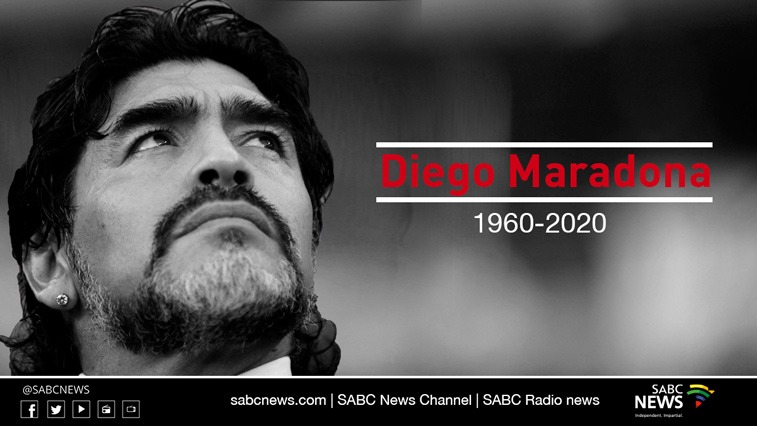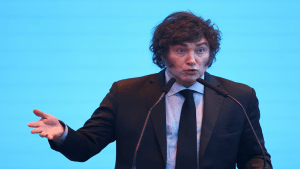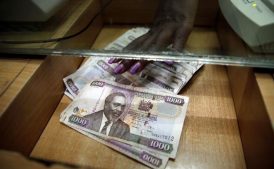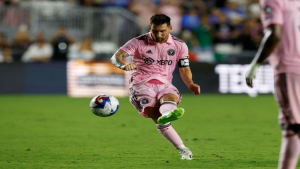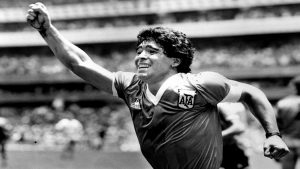Argentine President Alberto Fernandez has declared three days of national mourning for Argentine soccer legend Diego Maradona.
Maradona, widely regarded as one of the game’s greatest ever players, died of a heart attack on Wednesday, his lawyer said.
Maradona, 60, had for some time battled health issues and had in recenr weeks undergone emergency surgery for a subdural haematoma – a condition in which a blood vessel bursts near the surface of the brain.
He suffered a heart attack at his home in the outskirts of Buenos Aires on Wednesday, according to Argentinian media and acquaintances of the former player.
Retired Brazilian soccer star Pele was among those who mourned the Argentine player.
“Certainly, one day we’ll kick a ball together in the sky above,” he said in a brief statement provided to Reuters by a representative.
Que notícia triste. Eu perdi um grande amigo e o mundo perdeu uma lenda. Ainda há muito a ser dito, mas por agora, que Deus dê força para os familiares. Um dia, eu espero que possamos jogar bola juntos no céu. pic.twitter.com/6Li76HTikA
— Pelé (@Pele) November 25, 2020

FILE PHOTO: Argentinian star Diego Maradona raises his arm in the air after scoring his game winning goal against England in their World Cup semi final in Mexico, June 22, 1986.
Pinnacle of glory
One of the most gifted soccer players in history, Maradona’s pinnacle of glory came when he captained Argentina to win the World Cup in 1986, before plunging to misery when he has kicked out of the 1994 World Cup for doping.
One of football’s most iconic moments, in his own words#RIPDiego pic.twitter.com/YgEjQ1Q1H1
— Sport360° (@Sport360) November 25, 2020
Years of drug use, overeating, and alcoholism truncated a stellar career and altered his appearance from a lithe athlete who could slalom effortlessly through teams to an addict. Maradona nearly died of cocaine-induced heart failure in 2000.

Loading…
Following are reactions to his death:
SAFA is joining the rest of the football world in mourning and saying farewell to one of the greatest football icons ever to live on this earth.
RIP Diego Maradona pic.twitter.com/qYI8rrLOUP
— Bafana Bafana (@BafanaBafana) November 25, 2020

FILE PHOTO: Argentina’s coach Diego Maradona tries on sunglasses before a news conference ahead of their June 22 World Cup soccer match against Greece, at the Loftus Versfeld Stadium in Pretoria, South Africa June 21, 2010. REUTERS/Enrique Marcarian/File Photo
The man with the hand of God! Maradona’s legacy is something to cherish forever. Rest In Peace. ?#Maradona pic.twitter.com/2QR8aCMOlz
— ?????? ?????? ? (@CarbieWarbie) November 25, 2020
It’s sucks when legends leave us #Maradona pic.twitter.com/YNIzFoz24i
— Marcello Palombi (@MarchyPalombi) November 25, 2020
ON THE BALL FROM THE START
Born on October 30, 1960 in the Buenos Aires working class suburb of Lanus, the fifth of eight children of a factory worker, Maradona grew up in the Villa Fiorito shanty town.
His mother Dalma, known to his fans as “Dona Tota,” saw a star reflected on the floor in the church where her son was baptized and imagined a bright future as an accountant.
But Maradona’s love affair with soccer was apparent from the start. Given his first football as an infant, he slept with it under his arm.
Discovered in street kickabouts by the scout for first division club Argentinos Juniors, the prodigy made his league debut at 15.
At 17 he just missed inclusion in Argentina’s 1978 World Cup-winning squad at home. In the 1982 tournament in Spain, a sending-off against Brazil was a fitting prologue to two unhappy seasons at Barcelona, marred by hepatitis and injury.
But then came liberation, and triumph. In 1984, he moved to Napoli for a then world-record $7.5 million contract. Maradona helped underdogs Napoli to the Italian title twice – creating a whole new set of adoring fans in the process.
And, after the 1986 World Cup triumph in Mexico, he also coaxed a mediocre Argentine team to a second successive World Cup final in Rome in 1990.



